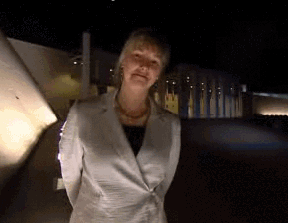|
|
|
|
|
|
|
News & Views item - July 2009 |
![]() A Day in the Life of the Chief Scientist.
(July 7, 2009)
A Day in the Life of the Chief Scientist.
(July 7, 2009)
Last Thursday, July 2, ABC1 TV's Catalyst aired a five minute segment titled "A day in the life of the Chief Scientist". It's introduced with: "Keeping abreast of scientific developments, advising government and working closely with the Prime Ministerís office - see what a day in the life of Australia's Chief Scientist, Professor Penny Sackett entails".
Disappointedly Catalyst appears primarily interested in portraying Professor Sackett as a nice guy. For example, there is nothing in the segment showing Professor Sackett -- "Australia's top boffin", their words -- in her role of advising government and working closely with the Prime Ministerís office.
Well, what should you expect in 5'17".
To watch the video clip, click here.
Below is a copy of the transcript.
___________________________________
 NARRATION
(PROF. PENNY SACKETT)
NARRATION
(PROF. PENNY SACKETT)
The role of the chief scientist is to provide independent advice to government,
about matters of science, technology, innovation that affect Australia and its
people.
Tonight I've been invited by the Australian Academy of Science to give a brief
introductory speech. It's part of a celebration that the academy undertakes
yearly to celebrate science.
PROF. PENNY SACKETT
This is a very pleasurable part of my job. I don't get to do it very often but
it's really a pleasurable thing, to be in the company of such eminent
scientists.
PROF. KURT LAMBECK
Tonightís guest speaker: Prof Penny Sackett
PROF. PENNY SACKETT
We need the youth of today to become the scientists of tomorrow.
SIR GUSTAV NOSSAL
Her coordinating function, her function of presenting to the Cabinet what's
great in Australian science and what the future priorities will be, is very very
important. So I'm thrilled at her appointment.
NARRATION (PROF. PENNY SACKETT)
My background is in the physical sciences' and as I went through my career more
and more I found myself doing research in astrophysics. I came to Australia
about seven years ago to take up the post of director of Mount Stromlo
Observatory knowing that Australia was a wonderful place for astronomy.
In January of 2003, only six months after I'd started most of the observatory
was destroyed by a massive bushfire. That gives one pause to take stock in
what's important and how to rebuild into the future. I was appointed chief
scientist on the 3rd November, last year 2008
I'd like to think that this office is one of the most important links, between
the scientific activity in Australia and the government. I find to really learn
the most about science I can't wait for people to come and knock on my door, I
actually need to go out into the field and see what they're doing.
When I took up this role I knew that climate change was going to be one of the
most important things that I addressed as chief scientist. A piece of that of
course is making sure that the way that we use energy and the sources that we
take it from are sustainable going into the future. I think solar technology, I
think what it provides is an example of one of those technologies. And goodness
knows Australia's blessed with plenty of sunshine.
The job can be rather exhausting, but I like to think that I'd rather be busy
than bored. And in this post I've not yet been bored.
PROF. PENNY SACKETT
Contemplative moments like this are rare and treasured. And to be honest I
usually bring my work along with me.
NARRATION (PROF. PENNY SACKETT)
Thinking about science education more broadly is a very big piece of the chief
scientist role.
PROF. PENNY SACKETT
Hi howís it going?
DANIEL (PHD STUDENT)
Good itís all finished now.
PROF. PENNY SACKETT
Pretty big day hey? Ok letís have a look
DANIEL (PHD STUDENT)
Thatís four years worth of work there.
NARRATION (PROF. PENNY SACKETT)
This is a very important part of my job. I don't get to do as much of it as I'd
like, I suppose in many ways I live my scientific life vicariously through
students.
DANIEL (PHD STUDENT)
Now that youíre chief scientist itís harder to get a meeting, but when we do get
a meeting itís fantastic.
PROF. PENNY SACKETT
It's a very satisfying job in many ways a perfect blend of being able to learn
about the forefront of many sorts of science, and at the same time feel that you
are able to do a service to the country in which you live.